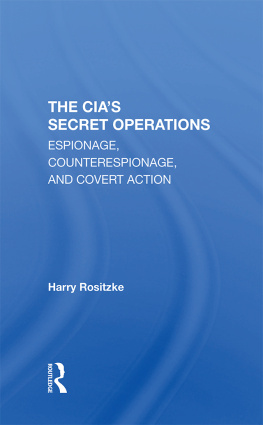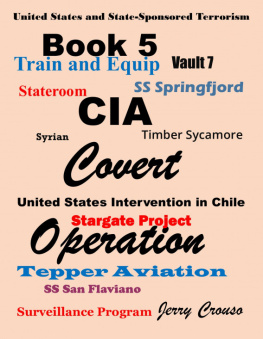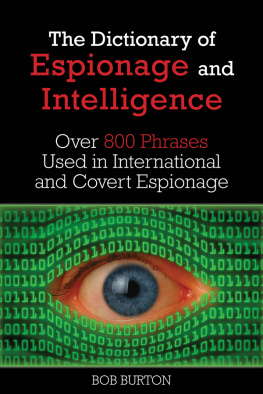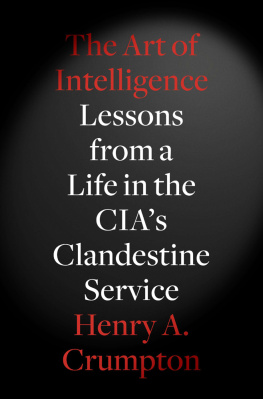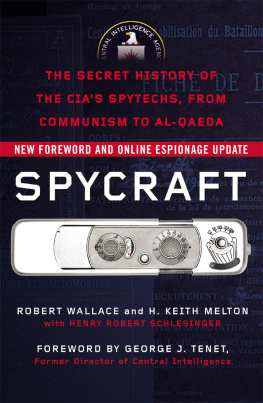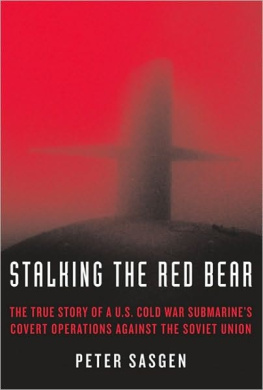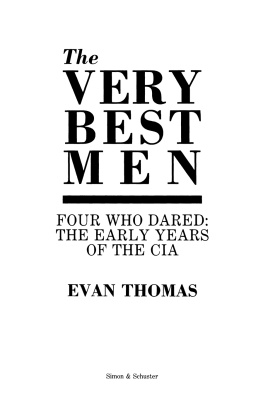THE CIA'S
A WESTVIEW ENCORE EDITION
The Cia's Secret Operations
Espionage, Counterespionage, and Covert Action
Harry Rositzke
First published 1977 by Westview Press
Published 2019 by Routledge
52 Vanderbilt Avenue, New York, NY 10017
2 Park Square, Milton Park, Abingdon, Oxon OX14 4RN
Routledge is an imprint of the Taylor & Francis Group, an informa business
Copyright 1977 by Harry Rositzke
All rights reserved. No part of this book may be reprinted or reproduced or utilised in any form or by any electronic, mechanical, or other means, now known or hereafter invented, including photocopying and recording, or in any information storage or retrieval system, without permission in writing from the publishers.
Notice:
Product or corporate names may be trademarks or registered trademarks, and are used only for identification and explanation without intent to infringe.
Library of Congress Cataloging-in-Publication Data
Rositzke, Harry.
The CIAs secret operations: espionage, counterespionage, and
covert action / by Harry Rositzke.
p. cm.
A Westview encore edition.
Includes index.
ISBN 0-8133-7604-1
1. United States. Central Intelligence Agency. 1. Title.
JK468.I6R67 1988
327.1'2'06073dc19 88-5666
CIP
ISBN 13: 978-0-367-29088-7 (hbk)
To the memory of
LOWRIE CAMPBELL CHARLES KATEK RICHARD WELCH
BOOKS BY HARRY ROSITZKE
The CIA's Secret Operations
The Peterborough Chronicle
The USSR Today
Left On! The Glorious Bourgeois Cultural Revolution
Acknowledgments
I am grateful to those of my colleagues in this first generation of American "spymasters" who were willing to share their experiences with me even after I retired to my unclassified farm. I am indebted to Howard Roman, who worked with Allen Dulles on his intelligence writings, for his assistance in the preparation of the early chapters, and to Nancy Kelly, my editor at Reader's Digest Press, for the sharp edge of her pruning shears.
Many hitherto classified facts have now been made public in the various reports of the official Washington investigations. I have found it useful to cite some of these now open facts and to quote some official conclusions on matters beyond my competence:
Report to the President by the Commission on CIA Activities within the United States, June 1975 (the Rockefeller Report).
Alleged Assassination Plots Involving Foreign Leaders, an interim report of the Senate Select Committee on Intelligence Activities, November 1975.
Covert Action in Chile 1963-73, a staff report by the Senate Select Committee on Intelligence Activities, 1975.
Foreign and Military Intelligence, Book I, part of the Final Report of the Senate Select Committee on Intelligence Activities, April 1976.
Harry Rositzke
Contents
"I wish to be useful, and every kind of service necessary to the public good becomes honorable by being necessary."
NATHAN HALE
In the late spring of 1944 I went from the Office of Strategic Services in Washington, where I had been editor of a weekly intelligence bulletin in the Research and Analysis Branch, to a similar job at OSS/London. There I encountered an old friend from Harvard, Philip Horton, author of an excellent biography of Hart Crane and in the late 1930s curator of the poetry room in the Widener Library. Horton was improbably installed at a desk in Secret Intelligence. Soon after I arrived, the intelligence demands generated by the Normandy invasion led to the coordination of SI and R&A intelligence dissemination in a joint Reports Board.
Horton was put in charge; I was assigned to the new board as the R&A representative and eventually as Horton's deputy for political intelligence. In this capacity I worked closely with Horton's deputy for military intelligence, a bright, breezy and sardonic former instructor in linguistics from the University of Rochester. This was Harry Rositzke.
In the autumn we all went on to Paris.Rositzke's job was far more important than mine. I was greatly impressed by the efficiency and aplomb with which he managed the intricate problems involved in getting intelligence from agents behind the lines to armies fighting in the field. The pressure was unrelenting. Lives, even battles, depended on the accuracy of reports on order-of-battle, troop movements, weaponry and on the speed with which information was transmitted to the appropriate commands. The cool and resourceful Rositzke was plainly a brilliant intelligence officer. When the pressure was occasionally off, we wandered around Paris, discussing the diversity of subjects, sacred and profane, meditated by men in their twenties in hectic times when war was the reality and peace only a faint hope.
Harry Rositzke thought then of resuming his academic career. We moved on to Germany in the spring of 1945, making our headquarters in a champagne factory outside Wiesbaden. The Soviet Union was growing as an intelligence problem; no surprise to those whose sympathies lay with the democratic left in Europe. I was demobilized in the autumn and returned to literary pursuits. I was not much surprised to hear in due course that Rositzke had decided to stay on in intelligence. War had made him a professional. Peace evidently offered him scope for analysis and action on questions more urgent than Anglo-Saxon grammar, his previous specialty.
I saw him from time to time in the next years. When in the United States, he came to New York for occasional reunions with Horton, William Casey, Jay Gold, Walter Lord and other wartime comrades. In 1961 I learned that he was CIA station chief in New Delhi, where Kenneth Galbraith was about to go as ambassador. Galbraith was healthily suspicious of the CIA. I assured him he would have no trouble with Rositzke; their senses of humor were too much akin; also their senses of reality. Galbraith told me later they had gotten along fine.
In time Rositzke retired from the Agency. Soon the CIA became the subject of public concern and then of congressional inquiry. Controversy centered less on CIA's primary purpose, which is the collection and analysis of intelligence, than on its secret operations: espionage, counterespionage and most especially "covert action,"that is, clandestine undertakings designed to influence events in other nations. From his farm in Middleburg, Virginia, Rositzke volleyed barrages into the debate. His contributions were independent and informed, sometimes critical of the Agency, sometimes of the critics. The debate itself showed the need for more information as to what the CIA has actually been up to in its secret operations over the last thirty years. Rositzke has now tried to meet this need in this fascinating book.
The CIA's Secret Operations is not, nor is it represented as being, nor in the nature of things can it be, the complete story. But it is much more complete than any account available to the public. No other nation would have permitted so candid and sustained a disclosure in so sensitive a field. E. H. Cookridge, in the preface to the American edition of his story of the British Special Operations Executive (called Set Europe Ablaze in the United States; Inside S. O. E. in England), describes the problems he met in telling the story, a quarter-century later, of British covert action during the Second World War. Rositzke's work carries aspects of the American story up to the 1970s. One doubts whether the CIA would have cleared such a book a decade ago. Its publication now is a salutary by-product of the belated surge of public concern.


